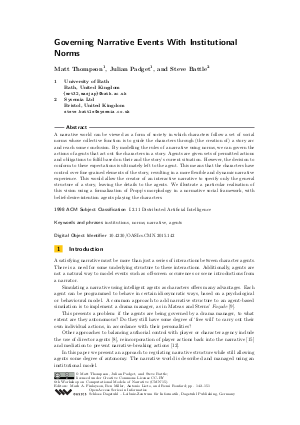Governing Narrative Events With Institutional Norms
Authors Matt Thompson, Julian Padget, Steve Battle
-
Part of:
Volume:
6th Workshop on Computational Models of Narrative (CMN 2015)
Part of: Series: Open Access Series in Informatics (OASIcs) - License:
 Creative Commons Attribution 3.0 Unported license
Creative Commons Attribution 3.0 Unported license
- Publication Date: 2015-08-14
File

PDF
OASIcs.CMN.2015.142.pdf
- Filesize: 382 kB
- 10 pages
Document Identifiers
Subject Classification
Keywords
- institutions
- norms
- narrative
- agents
Metrics
- Access Statistics
-
Total Accesses (updated on a weekly basis)
0PDF Downloads0Metadata Views
Abstract
A narrative world can be viewed as a form of society in which characters follow a set of social norms whose collective function is to guide the characters through (the creation of) a story arc and reach some conclusion. By modelling the rules of a narrative using norms, we can govern the actions of agents that act out the characters in a story. Agents are given sets of permitted actions and obligations to fulfil based on their and the story’s current situation. However, the decision to conform to these expectations is ultimately left to the agent. This means that the characters have control over fine-grained elements of the story, resulting in a more flexible and dynamic narrative experience. This would allow the creator of an interactive narrative to specify only the general structure of a story, leaving the details to the agents. We illustrate a particular realisation of this vision using a formalization of Propp’s morphology in a normative social framework, with belief-desire-intention agents playing the characters.
Cite As Get BibTex
Matt Thompson, Julian Padget, and Steve Battle. Governing Narrative Events With Institutional Norms. In 6th Workshop on Computational Models of Narrative (CMN 2015). Open Access Series in Informatics (OASIcs), Volume 45, pp. 142-151, Schloss Dagstuhl – Leibniz-Zentrum für Informatik (2015)
https://doi.org/10.4230/OASIcs.CMN.2015.142
BibTex
@InProceedings{thompson_et_al:OASIcs.CMN.2015.142,
author = {Thompson, Matt and Padget, Julian and Battle, Steve},
title = {{Governing Narrative Events With Institutional Norms}},
booktitle = {6th Workshop on Computational Models of Narrative (CMN 2015)},
pages = {142--151},
series = {Open Access Series in Informatics (OASIcs)},
ISBN = {978-3-939897-93-4},
ISSN = {2190-6807},
year = {2015},
volume = {45},
editor = {Finlayson, Mark A. and Miller, Ben and Lieto, Antonio and Ronfard, Remi},
publisher = {Schloss Dagstuhl -- Leibniz-Zentrum f{\"u}r Informatik},
address = {Dagstuhl, Germany},
URL = {https://drops.dagstuhl.de/entities/document/10.4230/OASIcs.CMN.2015.142},
URN = {urn:nbn:de:0030-drops-52889},
doi = {10.4230/OASIcs.CMN.2015.142},
annote = {Keywords: institutions, norms, narrative, agents}
}
Author Details
References
-
Vincent Baines and Julian Padget. A situational awareness approach to intelligent vehicle agents. In Michael Behrisch and Melanie Weber, editors, Modeling Mobility with Open Data, Lecture Notes in Mobility, pages 77-103. Springer International Publishing, 2015.

-
Chitta Baral. Knowledge representation, reasoning and declarative problem solving. Cambridge university press, 2003.

-
Pablo Cayetano Noriega Blanco-Vigil. Agent mediated auctions: the fishmarket metaphor. PhD thesis, Universitat Autònoma de Barcelona, 1998.

-
Owen Cliffe, Marina De Vos, and Julian Padget. Specifying and reasoning about multiple institutions. In Coordination, Organizations, Institutions, and Norms in Agent Systems II, pages 67-85. Springer, 2007.

-
Martin Gebser, Benjamin Kaufmann, Roland Kaminski, Max Ostrowski, Torsten Schaub, and Marius Schneider. Potassco: The Potsdam answer set solving collection. AI Communications, 24(2):107-124, 2011.

-
Robert Kowalski and Marek Sergot. A logic-based calculus of events. In Foundations of knowledge base management, pages 23-55. Springer, 1989.

-
JeeHang Lee, Tingting Li, and Julian Padget. Towards polite virtual agents using social reasoning techniques. Computer Animation and Virtual Worlds, 24(3-4):335-343, 2013.

-
Seung Y Lee, Bradford W Mott, and James C Lester. Learning director agent strategies: An inductive framework for modeling director agents. In Intelligent Narrative Technologies, 2011.

-
Michael Mateas and Andrew Stern. Façade: An experiment in building a fully-realized interactive drama. In Game Developers Conference, pages 4-8, 2003.

-
Vladimir Propp. Morphology of the Folktale. University of Texas Press, 2010.

-
Raymond Reiter. The frame problem in the situation calculus: A simple solution (sometimes) and a completeness result for goal regression. Artificial intelligence and mathematical theory of computation: papers in honor of John McCarthy, 27:359-380, 1991.

-
Justus Robertson and Robert Michael Young. Modelling character knowledge in plan-based interactive narrative to extend accomodative mediation. In Ninth Artificial Intelligence and Interactive Digital Entertainment Conference, 2013.

-
Juan A Rodriguez-Aguilar et al. On the design and construction of Agent-mediated Institutions. PhD thesis, Universidad Autónoma de Barcelona, 2001.

-
James A Russell. A circumplex model of affect. Journal of personality and social psychology, 39(6):1161, 1980.

-
Zach Tomaszewski. On the use of reincorporation in interactive drama. In Intelligent Narrative Technologies, 2011.

-
Javier Vázquez-Salceda. The role of norms and electronic institutions in multi-agent systems applied to complex domains. the harmonia framework. AI Communications, 16(3):209-212, 2003.

